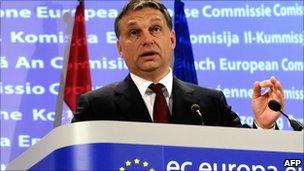Hungary: Media law row overshadows EU presidency
- Published

Prime Minister Viktor Orban has sought to defuse the crisis
The continuing row over a controversial new Hungarian media law, which its critics claim represents a full-scale assault on press freedom, inevitably overshadowed the launch of Hungary's first ever six-month term in the European Union presidency.
It is a moment for Hungary to be in the European spotlight, to try to shape the EU's agenda. But what if the country concerned is seen by some as falling short of the liberal values espoused by other European Union countries?
The centre-right Hungarian government of Prime Minister Viktor Orban enjoys an unprecedented two-thirds majority in parliament, enabling it to make radical changes to the country's institutions. For Mr Orban and his government this means modernisation - in the case of the media law, sweeping away old legislation and introducing a range of new measures intended to clamp down, for example, on racist and anti-Semitic material.
The whole row has inevitably become highly politically charged. But there's no doubt that the national public media is being concentrated, slimmed down and is now managed by government appointees. Many broadcast journalists fear that at a time of looming job losses, this is not a good moment to say things that the government might not like. The economic pressures are real enough.
But the government's protestations that it has the best of intentions are greeted with scepticism by journalists from newspapers who do not follow the government's political line.
Gabor Horvat is the deputy editor of the centre-left daily Nepszabadsag.
It's the country's biggest selling quality broadsheet.
"Just imagine a situation," he says, "where you are living in a neighbourhood where a guy is walking around with a huge gun but he says he's a good guy and will not use it. How worried would you be?"
"The government too", he argues, "says that it's a good guy and will not use the massive fines in the new media law to stifle views it does not like."
But he feels that key constitutional checks and balances are being removed.
'Stereotypes'
Prime Minister Viktor Orban has sought to defuse the crisis by accepting that EU legal experts will now go through the new legislation with a fine-toothed comb.
If they find things that are contrary to European law, he says, then changes will be made.
But he clearly does not believe that this will be necessary. He has also sought to dampen criticism by insisting that the implementation of the new law will be closely monitored. If some of its critics' worst fears are realised, then, he says, changes will again be contemplated.
For now this seems to have satisfied the EU.
European Commission President Jose Manuel Barroso welcomed this commitment, and expressed his confidence in Hungarian democracy and in its government's support for the rule of law.
Both he and Mr Orban do not want to see Hungary's presidency undermined by this issue.
However, just a little pointedly perhaps, Mr Barroso made it clear that Hungary too had to take every step at home to make sure that there were no doubts about its democratic credentials.
Indeed some officials here in Budapest believe that the media row has just been an excuse to revive old prejudices and to cast doubts on the strength of Hungary's relatively young democracy, only 20 or so years since the end of communism.
Junior Minister for Government Communication Zoltan Kovacs is in no doubt. "These types of stereotypes," he told me, "are still with us and its very hard to fight against them.
"Look, it's really a kind of an insult when I have to prove that I am a democrat. I think in all measures we share the common values of the European Union."
Those close to the government in Budapest feel their country is attracting fire for its particular approach to managing the economic crisis. Big European multinational firms are critical of the crisis taxes that have been imposed on key sectors like energy and banking.
Hungary, the government's supporters believe, has enemies and that in part is why the media issue has been seized upon abroad.
Come what may, the implementation of these new Hungarian media laws is going to be closely watched as much in Brussels as in Budapest.
- Published6 January 2011
- Published6 January 2011
- Published3 January 2011